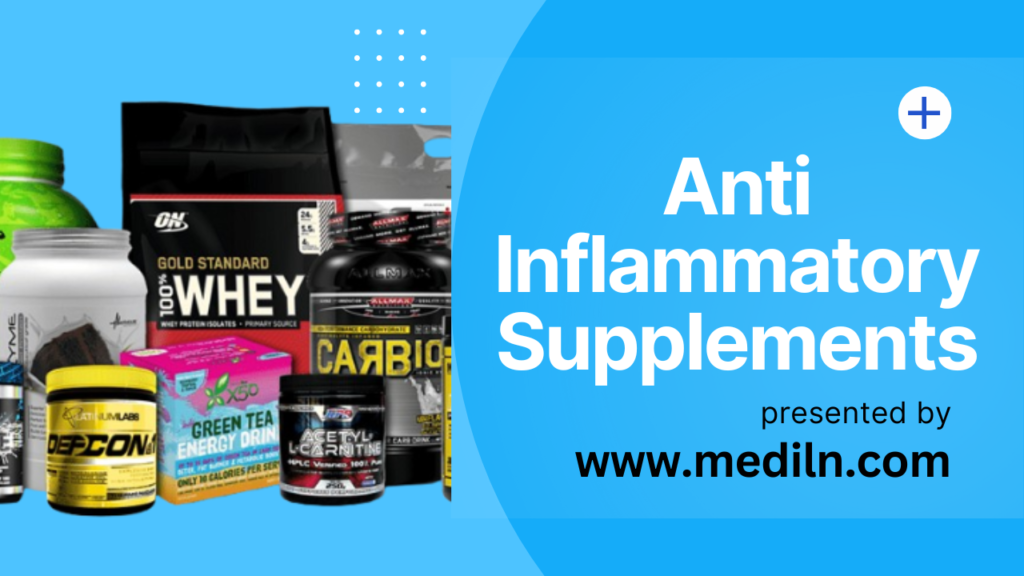Are you tired of feeling constantly achy, exhausted, and sluggish? 😫 Chronic inflammation might be the hidden culprit behind your health woes. But don’t worry, there’s hope on the horizon! 🌅
Inflammation is your body’s natural defense mechanism, but it can wreak havoc on your health when it goes into overdrive. From heart disease to autoimmune disorders, unchecked inflammation is at the root of many chronic conditions. But what if you could fight back with the power of nature? 🌿
In this eye-opening blog post, we’ll dive into the world of anti-inflammatory supplements that could be game-changers for your health. We’ll explore the link between inflammation and heart disease, uncover the best anti-inflammatory diets, and reveal powerful herbs and spices that can help tame the flames of inflammation. Get ready to discover 10 life-saving anti-inflammatory supplements that could transform your well-being and lead you to vibrant health!
What’s on this page
What you’ll find in this article
This comprehensive guide covers essential information about inflammation
Inflammation explained
What is inflammation?
Inflammation is the body’s natural response to injury, infection, or harmful stimuli. It’s a crucial part of the immune system’s defense mechanism. However, when inflammation becomes chronic, it can lead to various health issues.
Types of inflammation
There are two main types of inflammation:
- Acute inflammation
- Chronic inflammation
| Characteristic | Acute Inflammation | Chronic Inflammation |
| Duration | Short-term | Long-term |
| Onset | Rapid | Gradual |
| Cause | Injury or infection | Persistent irritants |
| Effects | Generally beneficial | Often harmful |
Signs and symptoms
Common signs of inflammation include:
- Redness
- Swelling
- Heat
- Pain
- Loss of function
Causes of chronic inflammation
Chronic inflammation can be triggered by various factors:
- Poor diet
- Stress
- Lack of exercise
- Environmental toxins
- Autoimmune disorders
Understanding inflammation is crucial for recognizing its impact on overall health. While acute inflammation is a necessary and beneficial process, chronic inflammation can contribute to numerous health problems, including heart disease, diabetes, and cancer. By identifying the causes and symptoms of inflammation, individuals can take proactive steps to manage and reduce its negative effects on their bodies.
Inflammation and heart disease
A. Want to get fit and healthy?
The link between inflammation and heart disease is a crucial aspect of overall health and fitness. Understanding this connection can be a powerful motivator for adopting a healthier lifestyle. Here are some key points to consider:
- Impact of inflammation on cardiovascular health:
- Increases risk of atherosclerosis
- Contributes to plaque formation
- Elevates blood pressure
- Promotes blood clot formation
- Increases risk of atherosclerosis
- Benefits of reducing inflammation for heart health:
- Improved blood flow
- Lower risk of heart attacks and strokes
- Enhanced overall cardiovascular function
- Better management of existing heart conditions
- Improved blood flow
To get fit and healthy while addressing inflammation, consider the following strategies:
| Strategy | Benefits for Heart Health |
| Regular exercise | Reduces inflammation, improves circulation |
| Anti-inflammatory diet | Provides essential nutrients, lowers oxidative stress |
| Stress management | Decreases cortisol levels, regulates blood pressure |
| Quality sleep | Supports immune function, aids in recovery |
By incorporating these strategies into your daily routine, you can significantly reduce inflammation and improve your heart health. Remember, small, consistent changes can lead to substantial improvements in your overall fitness and well-being.
Best anti-inflammatory diets
Mediterranean Diet
The Mediterranean diet is widely recognized as one of the most effective anti-inflammatory diets. Rich in fruits, vegetables, whole grains, and healthy fats, this diet offers numerous health benefits.
Key Components:
- Olive oil (primary source of fat)
- Fish and seafood (2-3 times per week)
- Fruits and vegetables (daily consumption)
- Whole grains and legumes
- Limited red meat intake
| Food Group | Examples | Frequency |
| Fruits & Vegetables | Tomatoes, leafy greens, berries | Daily |
| Whole Grains | Whole wheat bread, brown rice | Daily |
| Healthy Fats | Olive oil, avocados, nuts | Daily |
| Fish | Salmon, sardines, mackerel | 2-3 times/week |
| Lean Proteins | Poultry, eggs, legumes | Moderate |
| Red Meat | Beef, pork, lamb | Limited |
DASH Diet
The Dietary Approaches to Stop Hypertension (DASH) diet is another excellent anti-inflammatory eating plan. Originally designed to lower blood pressure, it has shown significant anti-inflammatory benefits.
Key Principles:
- Reduce sodium intake
- Increase consumption of potassium, calcium, and magnesium.
- Focus on whole foods and limit processed items.
- Incorporate lean proteins and low-fat dairy.
Now that we’ve explored these two powerful anti-inflammatory diets, let’s look at how they can be tailored for specific inflammatory conditions.
Anti-inflammatory diets for inflammatory conditions
Rheumatoid Arthritis
For those battling rheumatoid arthritis, an anti-inflammatory diet can be a powerful ally. Focus on:
- Omega-3 rich foods: fatty fish, flaxseeds, chia seeds
- Colorful fruits and vegetables: berries, leafy greens, bell peppers
- Whole grains: quinoa, brown rice, oats
- Lean proteins: chicken, turkey, legumes
Avoid processed foods, refined sugars, and excessive red meat consumption.
Inflammatory Bowel Disease (IBD)
Patients with IBD may benefit from a tailored anti-inflammatory approach:
- Low-fiber foods during flare-ups
- Probiotic-rich foods: yogurt, kefir, sauerkraut
- Omega-3 fatty acids: salmon, sardines, walnuts
- Well-cooked vegetables
- Avoid dairy, high-fat foods, sand picy dishe.s
Psoriasis
A diet focusing on anti-inflammatory foods can help manage psoriasis symptoms:
| Food Group | Include | Avoid |
| Fruits | Berries, citrus | Nightshades |
| Vegetables | Leafy greens, carrots | Eggplant, potatoes |
| Proteins | Fish, lean poultry | Red meat, processed meats |
| Fats | Olive oil, avocado | Trans fats, saturated fats |
Asthma
An anti-inflammatory diet for asthma management should emphasize:
- Vitamin C-rich foods: oranges, kiwi, broccoli
- Magnesium sources: spinach, pumpkin seeds, almonds
- Omega-3 fatty acids: chia seeds, flaxseeds, fatty fish
- Flavonoid-rich foods: apples, onions, berries
Limit or avoid dairy, artificial additives, and sulfites.
Now that we’ve explored specific anti-inflammatory diets for various conditions, let’s delve into the world of anti-inflammatory herbs and spices that can further enhance these dietary approaches.
Anti-inflammatory herbs and spices
Powerful Anti-Inflammatory Herbs
Many herbs and spices possess potent anti-inflammatory properties, making them excellent additions to your diet. Here are some of the most effective options:
- Turmeric: Contains curcumin, a powerful anti-inflammatory compound
- Ginger: Rich in gingerols that reduce inflammation
- Cinnamon: Helps lower inflammatory markers in the body.
- Garlic: Contains allicin, which has strong anti-inflammatory effects
- Rosemary: Rich in antioxidants that combat inflammation
Incorporating Anti-Inflammatory Spices in Your Diet
Adding these herbs and spices to your meals is an easy way to boost your anti-inflammatory intake. Here’s a comparison of their uses and benefits:
| Herb/Spice | Best Uses | Key Benefits |
| Turmeric | Curries, smoothies | Reduces joint pain, improves brain function |
| Ginger | Teas, stir-fries | Eases muscle pain, aids digestion |
| Cinnamon | Baked goods, oatmeal | Lowers blood sugar, improves heart health |
| Garlic | Savory dishes, dressings | Boosts immune system, lowers blood pressure |
| Rosemary | Roasted meats, soups | Enhances memory, reduces muscle pain |
By incorporating these herbs and spices into your daily diet, you can enjoy their flavors while benefiting from their anti-inflammatory properties. Remember, consistency is key when it comes to reaping the benefits of these natural anti-inflammatory agents. Next, we’ll explore the insights of an expert in the field of anti-inflammatory nutrition.
Meet the expert
What to read next…
After exploring the world of anti-inflammatory supplements, you might be interested in diving deeper into related topics. Here are some suggested readings to expand your knowledge:
- The Mediterranean Diet: A Comprehensive Guide
- Understanding Chronic Inflammation and Its Effects
- Natural Ways to Boost Your Immune System
Anti-inflammatory recipes
Incorporating anti-inflammatory ingredients into your diet can be both delicious and beneficial. Here are some easy-to-make recipes that pack a powerful anti-inflammatory punch:
- Turmeric Golden Milk
- Ginger and Lemon Tea
- Berry and Spinach Smoothie Bowl
| Recipe | Key Ingredients | Preparation Time |
| Turmeric Golden Milk | Turmeric, almond milk, honey | 5 minutes |
| Ginger and Lemon Tea | Fresh ginger, lemon, honey | 10 minutes |
| Berry and Spinach Smoothie Bowl | Mixed berries, spinach, Greek yogurt | 5 minutes |
Donate today
Your support can make a difference in advancing research on inflammation and its impact on various health conditions. By donating to reputable organizations, you contribute to:
- Funding cutting-edge research
- Developing new treatments
- Raising awareness about inflammatory diseases
Consider donating to organizations such as:
- The Inflammation Research Foundation
- The Arthritis Foundation
- The American Heart Association
Your generosity can help improve the lives of millions affected by inflammatory conditions worldwide.
Conclusion
Incorporating anti-inflammatory supplements into your daily routine can significantly improve your overall health and well-being. From understanding the basics of inflammation to exploring its link with heart disease, this guide has provided valuable insights into managing inflammatory conditions through diet and supplementation.
By adopting anti-inflammatory diets and incorporating herbs and spices known for their inflammation-fighting properties, you can take proactive steps towards a healthier lifestyle. Remember, consulting with a healthcare professional or nutritionist is essential before making significant changes to your diet or supplement regimen. Take charge of your health today by embracing these life-saving anti-inflammatory strategies.
The 5-Minute Weight Loss Hack (No Gym Needed!)



Pingback: 10 Healthy Food Hacks That Will Blow Your Mind
Pingback: Top 10 Anti-Inflammatory Supplements That Actually Work